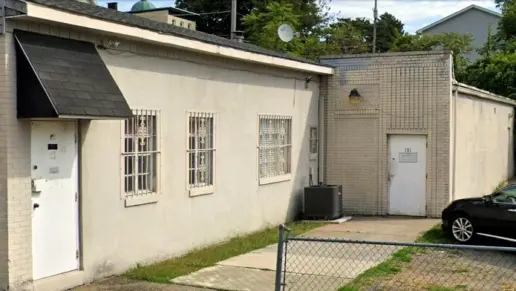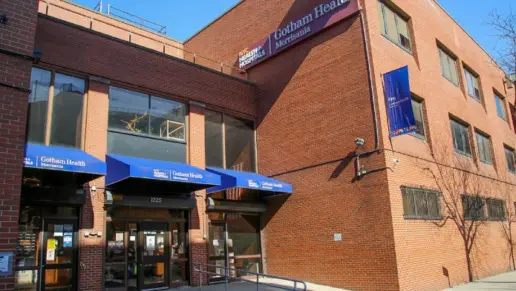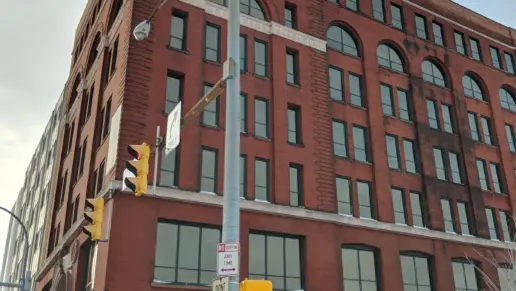I need to thank you, since I was part of your program and finished it, I haven't use any type of drugs. I remember everything you taught me, and I fight every day to maintain my sobriety because I'm proud of how far I've come, but I'm sure that none of this could be possible ...
About Long Island Center For Recovery
Long Island Center For Recovery is a drug and alcohol rehab located in Hampton Bays, New York. They provide treatment to veterans, first responders and adults of all genders who are struggling with co-occurring and substance abuse disorders. The levels of care available at this facility includes medical detox and residential treatment. They offer yoga, nutritional counseling, fire pit ceremonies, an LGBTQ pride group and drum and vibrational sound therapy among many other services. They work with different insurance plans and offer flexible private payment options.
What sticks out to me the most is their holistic approach to treatment and the variety they utilize specifically to heal the mind, body and spirit. During the beginning stages of the road to recovery, it becomes a very different lifestyle transition and taking care of your well-being becomes one of the main focuses.
Their nutritional counseling helps you create more balance in your diet and will give you practical tips to help you adopt eating habits. They will show you how to create healthy and tasty meals and guide you with creating a healthier diet, which can help with disease management, improve your mood, and boost energy.
Yoga therapy can help with improving memory and cognitive function. It also assists with pain management, creates mindfulness and alleviates stress. Yoga also works wonders for your body like improving flexibility, boosting blood circulation and reducing arthritis. Yoga can be an activity that can be done by yourself and with your loved ones encouraging you to remember how important it is to maintain self-care weekly.
Drum therapy is another therapy that can also be fun. In the beginning, you will make the same sound with the drums and match it to your heartbeat. This alone creates theta waves in the brain motivating multiple brain wave patterns. This helps with releasing emotional trauma, can encourage spirituality, create community, and assist with relaxation.
Latest Reviews
Rehab Score
Gallery
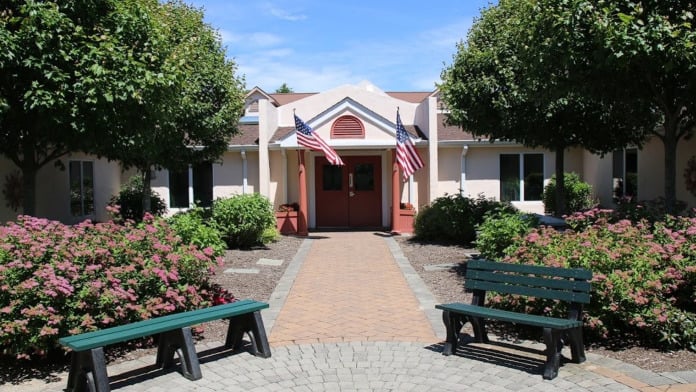

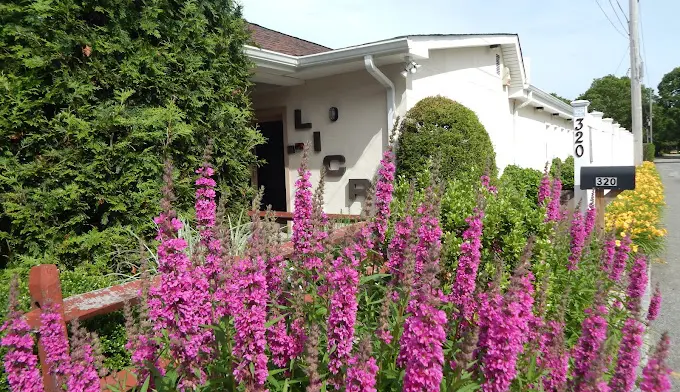
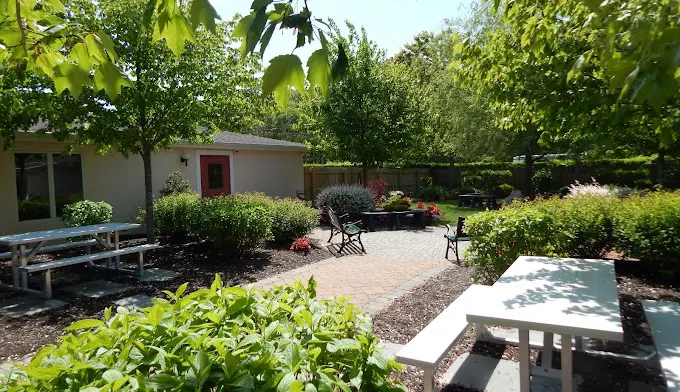
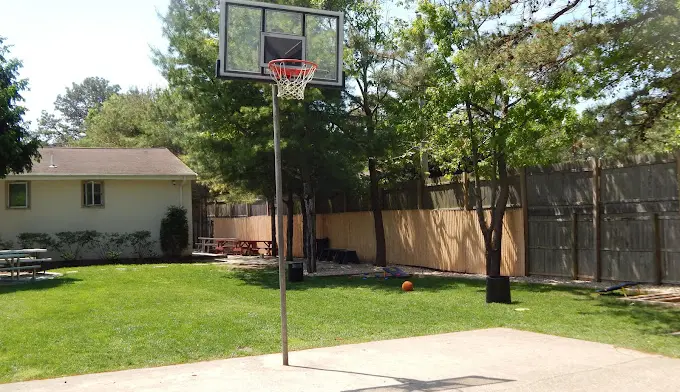
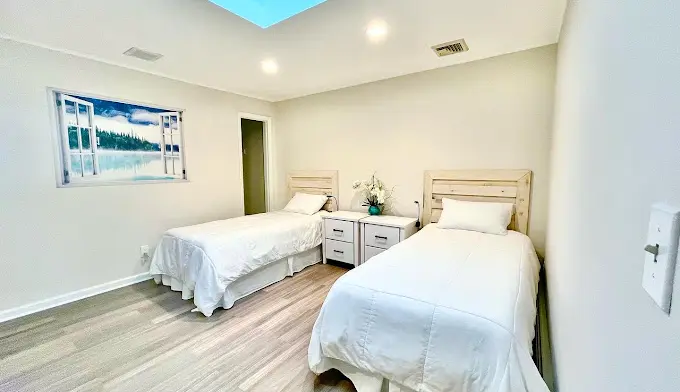
Location
Accepted Insurance




Other Forms of Payment
Private insurance refers to any kind of healthcare coverage that isn't from the state or federal government. This includes individual and family plans offered by an employer or purchased from the Insurance Marketplace. Every plan will have different requirements and out of pocket costs so be sure to get the full details before you start treatment.
Self-pay involves paying for treatment out of your own pocket. You can use savings or credit, get a personal loan, or receive help from family and friends to fund your treatment. If you don't have insurance or your insurance plan doesn't cover a specific program, self-pay can help ensure you still get the care you need.
Military members, veterans, and eligible dependents have access to specific insurance programs that help them get the care they need. TRICARE and VA insurance can help you access low cost or no cost addiction and mental health treatment. Programs that accept military insurance often have targeted treatment focused on the unique challenges military members, veterans, and their families face.
Addiction Treatments
Levels of Care
Treatments
The goal of treatment for alcoholism is abstinence. Those with poor social support, poor motivation, or psychiatric disorders tend to relapse within a few years of treatment. For these people, success is measured by longer periods of abstinence, reduced use of alcohol, better health, and improved social functioning. Recovery and Maintenance are usually based on 12 step programs and AA meetings.
When you choose drug rehab in New York, you'll participate in a variety of treatments that are designed to help you live a drug-free lifestyle. Common methods of treatment include group, individual, and family counseling, medication management, nutrition, exercise, and management of co-occurring mental health disorders.
Many of those suffering from addiction also suffer from mental or emotional illnesses like schizophrenia, bipolar disorder, depression, or anxiety disorders. Rehab and other substance abuse facilities treating those with a dual diagnosis or co-occurring disorder administer psychiatric treatment to address the person's mental health issue in addition to drug and alcohol rehabilitation.
A combined mental health and substance abuse rehab has the staff and resources available to handle individuals with both mental health and substance abuse issues. It can be challenging to determine where a specific symptom stems from (a mental health issue or an issue related to substance abuse), so mental health and substance abuse professionals are helpful in detangling symptoms and keeping treatment on track.
Opioid rehabs specialize in supporting those recovering from opioid addiction. They treat those suffering from addiction to illegal opioids like heroin, as well as prescription drugs like oxycodone. These centers typically combine both physical as well as mental and emotional support to help stop addiction. Physical support often includes medical detox and subsequent medical support (including medication), and mental support includes in-depth therapy to address the underlying causes of addiction.
Programs




Clinical Services
Cognitive Behavioral Therapy (CBT) is a therapy modality that focuses on the relationship between one's thoughts, feelings, and behaviors. It is used to establish and allow for healthy responses to thoughts and feelings (instead of unhealthy responses, like using drugs or alcohol). CBT has been proven effective for recovering addicts of all kinds, and is used to strengthen a patient's own self-awareness and ability to self-regulate. CBT allows individuals to monitor their own emotional state, become more adept at communicating with others, and manage stress without needing to engage in substance abuse.
Whether a marriage or other committed relationship, an intimate partnership is one of the most important aspects of a person's life. Drug and alcohol addiction affects both members of a couple in deep and meaningful ways, as does rehab and recovery. Couples therapy and other couples-focused treatment programs are significant parts of exploring triggers of addiction, as well as learning how to build healthy patterns to support ongoing sobriety.
Creativity is inherently healing, and can help those in recovery express thoughts or feelings they might not otherwise be able to. Creative arts therapy can include music, poetry/writing, painting, sculpting, dance, theater, sandplay, and more. Unlike traditional art, the final product matters far less than the experience of creation and expression itself.
Dialectical Behavior Therapy (DBT) is a modified form of Cognitive Behavioral Therapy (CBT), a treatment designed to help people understand and ultimately affect the relationship between their thoughts, feelings, and behaviors. DBT is often used for individuals who struggle with self-harm behaviors, such as self-mutilation (cutting) and suicidal thoughts, urges, or attempts. It has been proven clinically effective for those who struggle with out-of-control emotions and mental health illnesses like Borderline Personality Disorder.
Equine therapy, aka equine-assisted therapy (EAT), is a form of experiential therapy that involves interactions and activities with horses. It does not necessarily involve riding horses, but all activities related to horses, such as feeding, grooming, haltering and leading them. A mental health professional frequently oversees the activities (often in conjunction with a horse professional), and helps patients process their thoughts, feelings, and behavior patterns during and/or after the interaction.
Recreational Counseling at Long Island Center for Recovery (LICR) plays an important role in addiction treatment. It encourages clients to participate in the treatment’s recreational therapeutic activities and helps them to develop their own recreational pattern. Participating in recreational activities at Long Island Center for Recovery may involve a combination of both physical fitness and leisure activities.
EMDR is a therapeutic modality originally developed to help process trauma. In an EMDR session, a patient is prompted to undergo eye movements that mimic those of REM sleep. This is accomplished by watching a therapist's finger move back and forth across, or following a bar of light. The goal is repetitive sets of eye movements that help the brain reprocess memory, which can significantly reduce the intensity of remembered traumatic incidents. Associated memories can heal simultaneously, leaving patients significantly calmer, more stable, and more emotionally relaxed.
Families who struggle with addiction problem experienced by a member of the family can benefit significantly from family education and counseling therapies. These therapies are designed to help both the individual and their loved ones heal from addiction by structuring an interpersonal support network while receiving intensive therapeutic treatment services. Family education and counseling also aims to improve unhealthy interactions between family members by teaching effective communication skills and techniques, helping the family reach a better level of understanding of their individual needs, and repair any damages caused by previous confrontations or conflicts between family members.
Group therapy is one of the most widely practiced treatment methods in both inpatient and outpatient addiction treatment programs. It engages its participants by directing them through experiences, training them in acquiring a new set of techniques, or skills needed to solve problems related to their addiction. In group therapy, one or more therapists work with a small group of individuals to facilitate discussions as members share their experiences of how they are dealing with their addiction.
Individual therapy is a common therapeutic approach utilized in both inpatient and outpatient addiction treatment programs. Also known as Psychotherapy, talk therapy, or counseling, this therapy is specifically designed to help individuals identify, understand and learn how to solve issues that are related to their substance abuse and addiction. The overall focus of individual therapy is to help individuals make positive behavioral changes using newly learned skills and coping strategies to avoid relapse.
Motivational Interviewing (MI) is a clinical approach to helping people with substance abuse issues and other conditions shift behavior in positive ways. It is more goal-oriented than traditional psychotherapy, as MI counselors directly attempt to get clients to consider making behavioral change (rather than wait for them to come to conclusions themselves). Its primary purpose is to resolve ambivalence and help clients become able to make healthy choices freely.
Nicotine Replacement Therapy (NRT) is a way of getting nicotine into the bloodstream without smoking. It uses products that supply low doses of nicotine to help people stop smoking. The goal of therapy is to cut down on cravings for nicotine and ease the symptoms of nicotine withdrawal.
Nutrition therapy, aka medical nutrition therapy (MNT), is a way of treating physical, emotional, and medical conditions through diet. Specific dietary plans are designed by professional nutritionists or registered dietitians, and patients follow them in order to positively affect their physical and mental health.
Recreational therapy (aka therapeutic recreation) uses creative and fun activities to help with addiction recovery. Recreational therapists lead patients in entertaining and engaging activities like sports or games; art (drawing, painting, sculpture); drama, music, and dance; and/or community outings (field trips) to improve patients' physical, social, and emotional well-being.
Many individuals who struggle with substance abuse and addiction suffer from a past trauma as well. Addiction and trauma are known to be closely linked, and alcohol and drugs are often utilized in self-medication for individuals to escape from their troubling and painful past. When a client seeks addiction treatment at Long Island Center for Recovery and is diagnosed with a co-occurring disorder that is shown to be related to traumatic past event or events, specific therapeutic treatments are added to the rehab program. This additional trauma specific treatment will address the unresolved past trauma and clear the related painful and disturbing memories.
Amenities
-
Private Setting
-
Yoga Studio
-
Hiking
Accreditations

LegitScript has reviewed Long Island Center For Recovery as part of their certification program, and has determined that it meets the LegitScript standards for legality, safety and transparency.
LegitScript verified in

The Joint Commission, formerly known as JCAHO, is a nonprofit organization that accredits rehab organizations and programs. Founded in 1951, the Joint Commision's mission is to improve the quality of patient care and demonstrating the quality of patient care.
Joint Commission Accreditation: Yes
Accreditation Number: 86878
Contact Information
320 West Montauk Highway
Hampton Bays, NY 11946




